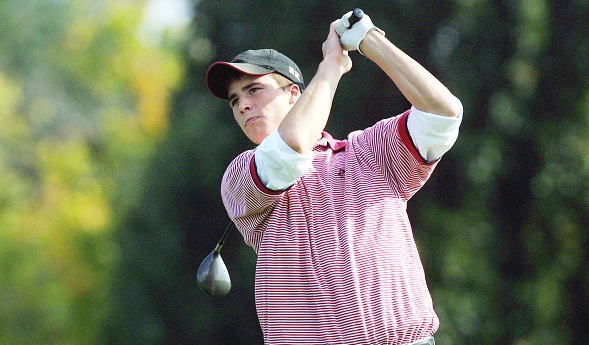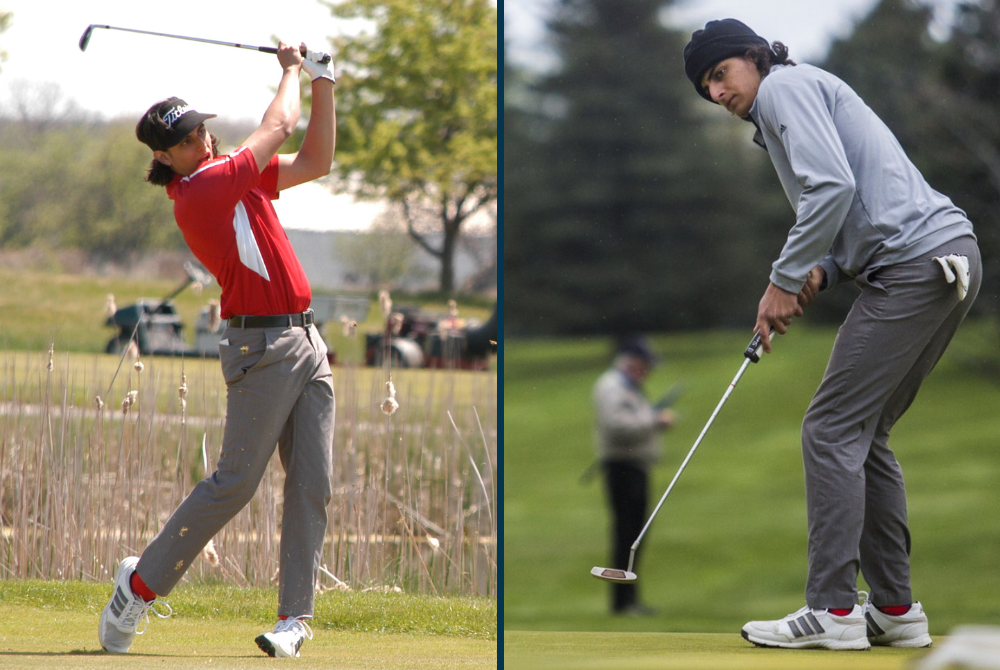
#TBT: Harmon's 135 Still All-Time Low
May 15, 2014
By Geoff Kimmerly
Second Half editor
It's been tough for golfers to remember sunny days this week, with most of Michigan seemingly under water – or, in the far north, snow.
But this week's Throwback Thursday recalls a fall weekend 12 years ago, when East Kentwood's Matt Harmon put up the brightest performance during the 36-hole era of MHSAA Boys Golf Finals.
Harmon shot 64-71 over two days at Michigan State University's Forest Akers East, with his 135 total the lowest of that Lower Peninsula Division 1 Final by four strokes and lowest score overall since the MHSAA Lower Peninsula tournament went to 36 holes in 1994.
East Kentwood also won the team championship that weekend, by 11 strokes. Although the Falcons finished only tied for ninth the following season at The Emerald in St. Johns, Harmon repeated as individual champion with a two-day 146 that included a first-round 68.
Harmon, who also had finished Division 1 runner-up as a freshman in 1999, went on to win the Mr. Golf Award in 2002, then star at MSU earning Big Ten Player of the Year in 2007.
Harmon played on the Web.com Tour in 2013, has played NGA Tour events so far in 2014 and is among those listed to play on the PGA Tour Canada this summer. All three are considered stepping stones to the PGA Tour.

Flashback 100: Wagner's Dream of Going on Tour Realized - with Greta Van Fleet
June 10, 2025
As a freshman, Frankenmuth golfer Daniel Wagner qualified individually for the 2014 Lower Peninsula Division 3 Boys Golf Final, finishing in a tie for 35th place. He improved the following year, tying for 26th as a sophomore, and by his junior season Frankenmuth qualified as a team and finished 11th overall with Wagner leading the way.
Heading into his senior season in 2017, Wagner and the Frankenmuth team were in top form, the Eagles as a team having placed second at their Regional and with Wagner finishing second individually as well. Expectations were high for a strong finish at the Final.
But Wagner never made it to the tournament — not due to injury or illness, but for an entirely different stage. He was in Sweden, performing with three friends from Frankenmuth as part of the emerging rock band Greta Van Fleet, during a showcase for music executives. Right after the showcase, the band went on tour across the United States.
That showcase marked the beginning of a meteoric rise. Since then, the band has released three albums — Anthem of the Peaceful Army (2018), The Battle at Garden’s Gate (2021) and Starcatcher (2023) — and earned four Grammy nominations, including a win for Best Rock Album in 2019.
Greta Van Fleet features brothers Joshua, Jake, and Sam Kiszka, along with Wagner, the band's drummer. The band took its name from longtime Frankenmuth resident Gretna Van Fleet.
Years after missing the 2017 Finals, Wagner reached out to the MHSAA about his lost 2016 Finals golf bag tag. A replacement was sent to him and he remains, to date, the only Grammy Award winner known to have one on his or her golf bag ...
Previous "Flashback 100" Features
May 23: Tarpley's Legendary Run Began as Portage Central's Miss Soccer - Read
May 16: Scane’s Record-Setting Lacrosse Run Began at Cranbrook Kingswood - Read
May 8: Duckett's High School Domination Extended to Shot Put Circle - Read
May 6: MHSAA Titles Just Start for NCAA Champion, Olympian Stark - Read
May 1: Legendary Actor Played Multiple Sports Roles at Country Day - Read
April 23: Legacy Program Provided Start for Pioneering NBA Official Schroeder - Read
April 11: Rice's Championship-Winning Ways Started at Flint Northwestern - Read
March 28: Youngquist's Times Still Among MHSAA's Fastest - Read
March 18: After 40 Years, Coles' Shot Remains Among Century's Most Famous - Read
March 7: Walled Lake Northern's Hellebuyck Reigns as NHL's Elite Netminder - Read
Feb. 27: Zeerip's Mat Stats Remain Rarely-Challenged Chart Toppers - Read
Feb. 21: Before TV Stardom, Kerwin Excelled as All-State Skier - Read
Feb. 14: Detroit Central Star Voted into Pro Football Hall of Fame - Read
Feb. 6: Multi-Sport Star Look Becomes Super Bowl Officiating Legend - Read
Jan. 31: Johnson Family Put Magical Stamp on Michigan High School Hoops - Read
Jan. 24: Future Hall of Famers Face Off First in MHSAA Class A Final - Read
Jan. 17: First-Ever WNBA Draft Pick Rocked at Salem, Won Titles at Tennessee - Read
Jan. 10: Despite Launching Before 3-Point Line, Smith Still Tops Scoring List - Read
Jan. 3: Edison's Jackson Earns Place Among State's All-Time Elite - Read
Dec. 20: Future Olympian Piper Leads Grosse Pointe North to Historic Heights - Read
Dec. 13: The Other Mr. Forsythe in Michigan School Sports - Read
Dec. 6: Coleman's Legendary Heroics Carry Harrison Through Repeat - Read
Nov. 29: Harbaugh Brothers' Football Roots Planted in Part at Pioneer - Read
Nov. 22: 8-Player Football Finals Right at Home at Superior Dome - Read
Nov. 15: Leland Career Helps Set Stage for Glass' International Stardom - Read
Nov. 8: Future Baseball Pro Led Escanaba's Legendary Football Title Run - Read
Nov. 1: Michigan High School Baseball Trio Provide World Series Voices - Read
Oct. 25: Before Leading Free World, Ford Starred for Champion GR South - Read
Oct. 18: Mercy Links Legend Becomes World Golf Hall of Famer - Read
Oct. 11: Fisher Races to Finals Stardom on Way to U.S. Olympic First - Read
Oct. 4: Lalas Leaves High School Legacies on Ice & Pitch - Read
Sept. 27: Tamer's History-Making Run Starts in Dexter, Continues to Paris - Read
Sept. 20: Todd Martin’s Road to Greatness Starts at East Lansing - Read
Sept. 13: James Earl Jones, Dickson High Hoops to Hollywood Legend - Read
Sept. 6: Pioneers' Unstoppable Streak Stretches 9 Seasons - Read
Aug. 30: Detroit dePorres Rushes to 1995 Class CC Football Championship - Read
(Photos courtesy of the Frankenmuth News, left, and Dan Wagner.)

